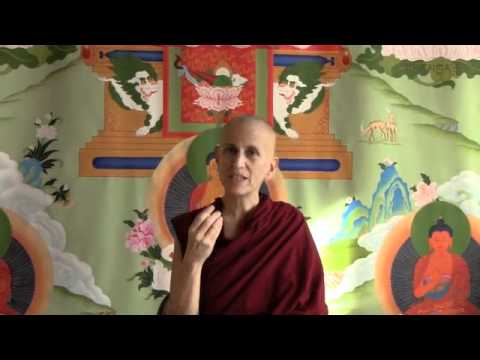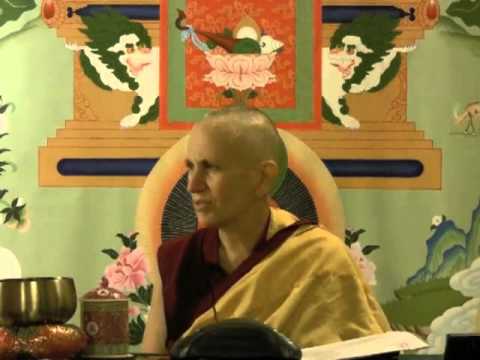Bodhicitta motivation
This talk was given during the White Tara Winter Retreat at Sravasti Abbey.
- What bodhicitta means
- Benefit of developing bodhicitta and the disadvantages of self-centeredness
- Blaming others gives away our power
- Taking responsibility allows us to change
White Tara Retreat 06: Bodhicitta motivation (download)
I’d like to talk a little bit more about the bodhicitta motivation because this is really crucial to our practice being something that’s worthwhile. As I was saying last time, bodhicitta involves having love and compassion for all sentient beings equally, not favoring friends, not being biased against people we don’t like. One of the chief things we have to overcome to develop love and compassion and bodhicitta is the self-centered thought.
The self-centered thought is the one that says, “I am the most important. My happiness matters more than anybody else’s. My suffering hurts more than anybody else’s and needs to be eliminated quicker than anybody else’s.” The self-centered thought prevents us from seeing our dependence on other living beings. We don’t consider that our food and clothing and shelter and everything come from the hard work of others; we just take it for granted. We don’t appreciate our teachers, we don’t appreciate our parents. We just think everybody is there and we’re entitled to all the benefit that we can get from them. Why? Because, “I am I! The world owes me something.”
With this mind, we have absolutely no awareness of the effect of our actions on other people because we’re only concerned with what we’re going to get out of something. So we act any old way we want to get what we want, and then we’re so surprised when people are unhappy with us. It’s true, isn’t it?
If we looked at our motivations, they’re completely selfish. I notice this a lot with the guys in prison that I work with. Often when they get to prison, they’re so angry at everybody. “My parents let me down. My friends let me down. My lawyer let me down. It’s everybody else’s fault I’m in prison except my own. The world mistreated me, that’s why I’m in prison. So I have a right to be angry at all these other people who betrayed me and made me wind up here.”
That way of thinking is a total 100% dead end, because we are giving away our power and saying, “I’m not responsible for my life.” If I blame everybody and I have no responsibility, then there’s nothing I can do. Then I sit and drown in my anger and my bitterness for years and decades until my life ends. But my situation never changes and I’m just as miserable and I’m still in prison.
Whereas, the moment that we accept responsibility for our actions, then that means we can change what we do. We can make amends for what we did. We can change as human beings and create a better future for ourselves and for others.
This is the key to why cherishing others and recognizing our interdependence with them is so vital to our own happiness and our own well being. The self-centered mind that is always thinking me actually creates the cause for us to experience more and more suffering. If we do a little bit of analysis, just looking directly at our own life experience—this is nothing theoretical or intellectual, we just look at our own life—this becomes very clearly evident.
Then, we begin to get the courage to change ourselves, to take responsibility, and to get in touch with our inner goodness; to bring forth our heart of kindness that cares about others. In doing so, we can completely turn our life around, and live a life that spreads joy to others and brings goodness in the world, and makes us feel better in the process as well as helps us to advance spiritually.
Venerable Thubten Chodron
Venerable Chodron emphasizes the practical application of Buddha’s teachings in our daily lives and is especially skilled at explaining them in ways easily understood and practiced by Westerners. She is well known for her warm, humorous, and lucid teachings. She was ordained as a Buddhist nun in 1977 by Kyabje Ling Rinpoche in Dharamsala, India, and in 1986 she received bhikshuni (full) ordination in Taiwan. Read her full bio.


